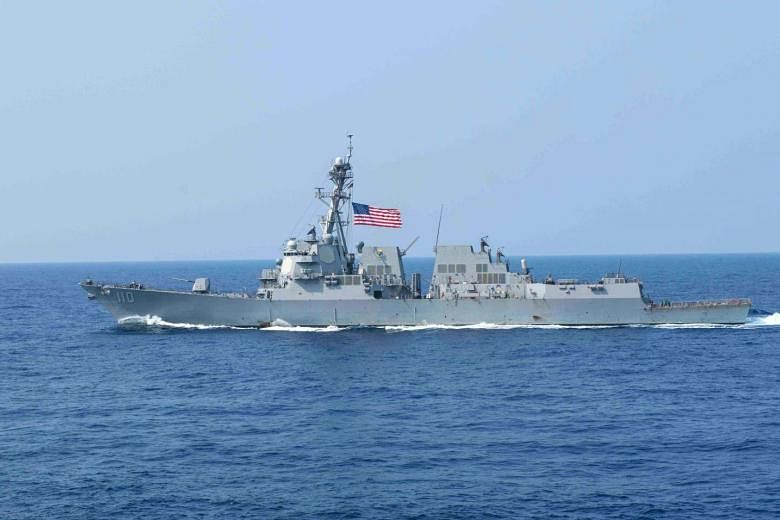BEIJING • China and the United States are pulling out all the stops before a court ruling on Beijing's claim to a large part of the South China Sea with a flurry of activity, including talks between their top military officers to ease tensions.
On Thursday, General Fang Fenghui, speaking to his US counterpart via a video link-up, said both sides should "manage their differences in a constructive way" and "refrain from actions detrimental to the relations between the two countries and the two militaries", the official Xinhua news agency reported yesterday.
Gen Fang, who is a member of the Central Military Commission, also told General Joseph Dunford, chairman of the US Joint Chiefs of Staff, that China was not to blame for tensions with the US in the South China Sea.
Xinhua quoted Gen Dunford as also calling for restraint and saying that the US was willing to work with China to establish "an effective mechanism on risk control so as to maintain stability in the South China Sea by peaceful means".
The discussion comes at a time of heightened tension between Beijing and Washington, which have traded accusations of militarising the South China Sea as China carries out large-scale land reclamation and construction on disputed features while the US has increased its patrols and exercises.
On Tuesday, China scrambled fighter jets as a US Navy guided missile destroyer sailed close to the disputed Fiery Cross Reef and denounced the patrol as an illegal threat to peace.
The US Defence Department said the latest "freedom of navigation" operation was undertaken to "challenge excessive maritime claims" by China, Taiwan and Vietnam that were seeking to restrict navigation rights in the South China Sea.
China claims most of the South China Sea, through which US$5 trillion (S$6.9 trillion) in ship-borne trade passes every year. The Philippines, Vietnam, Malaysia, Taiwan and Brunei have overlapping claims.
In 2013, the Philippines took its case against China to the Permanent Court of Arbitration (PCA) at The Hague, which is expected to give its ruling next month.
Beijing refused to take part in the proceedings and said it would reject the international court's ruling, which is not enforceable.
Dr Malcolm Davis, senior analyst at the Australian Strategic Policy Institute in Canberra, said: "If you think in terms of a chessboard, everyone is moving pieces around in anticipation of the next phase of events in the South China Sea emerging from that PCA finding."
China's top military officer recently visited Fiery Cross Reef, about 500km from the Philippines, along with singers to entertain troops.
Foreign Minister Wang Yi has roped in Russia and is claiming support from countries as diverse as Gambia, Poland and Qatar for aspects of China's argument that the tribunal has no jurisdiction and disputes should be resolved bilaterally.
Last month, US Defence Secretary Ash Carter joined an aircraft carrier in its patrol of the waters, shortly after agreeing to a beefed-up agreement that lets US troops rotate through military bases in the Philippines for the first time in decades.
US President Barack Obama will visit Vietnam this month before travelling to Japan for a Group of Seven summit, where he may seek endorsement of the tribunal's legitimacy.
Meanwhile, Taiwan yesterday urged the PCA not to make a ruling on a disputed South China Sea island without the five arbitrators in the Philippine case first seeing for themselves if it can sustain life.
Taiwan wants to prove that Itu Aba, which it calls Taiping Island, is not just a rock, but a real island that can qualify as a maritime economic zone.
"If the tribunal decides not to respond to our kind invitation, then it should not rule on the legal status of Taiping Island," Taiwan's foreign ministry said in a statement.
BLOOMBERG, REUTERS

